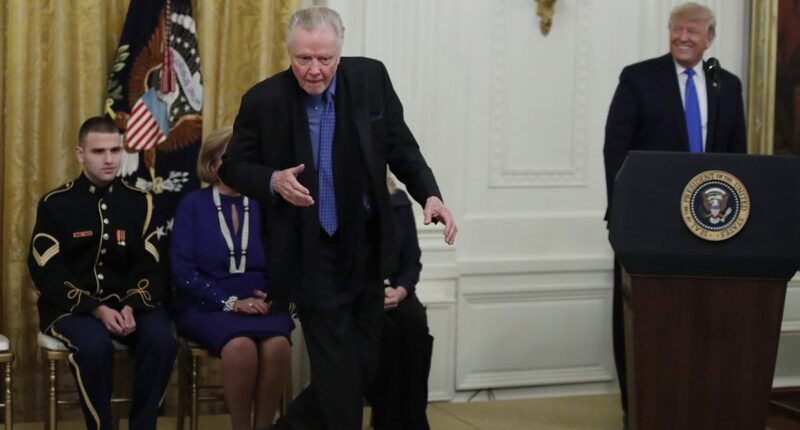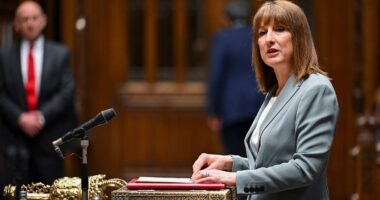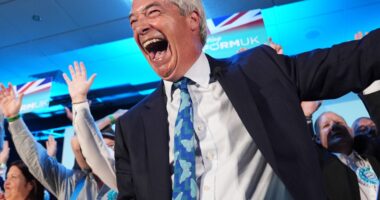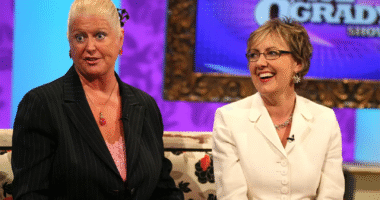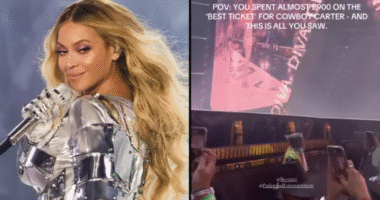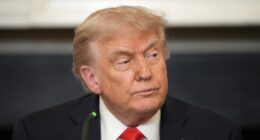
According to reports, Jon Voight, the father of Angelina Jolie, has been linked to Donald Trump’s trade war against the movie industry, sparking concerns that the upcoming James Bond movie might be filmed in Hollywood.
The 86-year-old Oscar-winning actor, known as one of Trump’s Hollywood advisors, reportedly influenced the President’s decision after discussions over the weekend, as per the latest report by The Times.
The film industry in the UK was left reeling after President Trump proposed a 100% tax on foreign-made movies, with industry insiders warning that such a move could have devastating effects on the British film sector.
Although Trump yesterday somewhat rowed back on his hardline approach, there are now genuine worries the next incarnation of the Bond franchise will be moved off these shores.
Voight’s proposals suggested tariffs ‘in certain limited circumstances’, The Guardian reported.
The Heat actor last night said the White House was now reviewing his plan as he declared: ‘The President loves the entertainment business and this country, and he will help us make Hollywood great again.’
Amazon’s $1billion deal for creative control of the franchise and pledge to make ‘drastic changes’ had already shaken 007 fans.
Rumours have already swirled that filming will be moved away from Bond’s spiritual home at Pinewood studios in Buckinghamshire.
Mark O’Connell, author of Catching Bullets: Memoirs of a Bond Fan, told the Telegraph: ‘I don’t mind change, but I think for the continuity of the new era of Bond, it should remain within the UK.’
Trump’s announcement followed his meeting at Mar-a-Lago with Voight, special advisor Steven Paul and media executive Scott Karol. The group mulled a range of ideas to revive domestic film and TV production, including federal tax incentives, tax code changes and imposing tariffs ‘in certain limited circumstances’, the group said in a statement.
The US president in January appointed Voight alongside his fellow Hollywood veterans Sylvester Stallone and Mel Gibson to bring the industry back ‘bigger, better and stronger than ever before’.
Oscar winner Alfonso Cuaron is reported to be in advanced talks to direct the next two Bond films.
Mexican Cuaron, whose credits include the Oscar-winning films Roma and Gravity, came close to signing on to direct The World Is Not Enough in 1999, and had meetings with Barbara Broccoli and her team before thinking again.
While numerous sources say that new Bond producers David Heyman and Amy Pascal are planning a modern reboot – with a young, most likely homegrown leading man as the iconic British super-spy.
A source said: ‘Work has started and the aim is to bring out a big-budget release and reboot in late 2026 or 2027. It’s going to be a clean start and a clean slate.
‘Not period. The thrill of new technology and new cars and new clothes has always been a part of it.’
Matthew Field, who is on the board of directors of the Ian Fleming Foundation and the co-author of Some Kind Of Hero: The Remarkable Story Of The James Bond Films, reckons the next film would be just the first step in a long journey.
He says: ‘Amazon are most certainly going to get a ‘tentpole film’ [a major release expected to generate a lot of revenue] out first, to set the agenda for the new Bond universe.
‘The obvious spin-offs would be a series on Miss Moneypenny or Q – but they can only do these once we know and understand who Moneypenny and Q are, in the new era of Bond.’
The Harry Potter film series was shot almost entirely in Britain, while filming for most of the Bond movies since the 1960s has been based at world-renowned Pinewood Studios in Buckinghamshire.
The Broadcasting, Entertainment, Communications and Theatre Union (Bectu) has urged the Government to ‘move swiftly’ to defend the sector.
Philippa Childs, head of the Broadcasting, Entertainment, Communications and Theatre Union (Bectu), said the UK industry is ‘only just recovering’ from the impact of the Covid-19 pandemic, when many productions were delayed or cancelled.
‘The UK is a world leader in film and TV production, employing thousands of talented workers, and this is a key growth sector in the Government’s industrial strategy,’ she said.
‘These tariffs, coming after Covid and the recent slowdown, could deal a knock-out blow to an industry that is only just recovering and will be really worrying news for tens of thousands of skilled freelancers who make films in the UK.
‘The Government must move swiftly to defend this vital sector, and support the freelancers who power it, as a matter of essential national economic interest.’
Culture, media and sport committee chairwoman Dame Caroline Dinenage said ‘making it more difficult to make films in the UK is not in the interests of American businesses’. She added: ‘Their investment in facilities and talent in the UK, based on US-owned IP [intellectual property], is showing fantastic returns on both sides of the Atlantic.’
A government spokesman said they will take a ‘calm and steady approach’ to talks with the US.
Trade deal talks are ongoing between the UK and US, but it is understood that a carve out from the film tariffs is unlikely to form part of any initial agreement.
Instead, officials hope to find a ‘forward-looking mechanism’ to talk about possible future tariffs – including those announced by Mr Trump yesterday.
Mr Trump said he has permitted the Department of Commerce and the Office of the US Trade Representative to impose the 100 per cent tariff ‘on any and all Movies coming into our Country that are produced in Foreign Lands’.
‘The Movie Industry in America is DYING a very fast death,’ he wrote last night on his Truth Social platform, complaining that other countries ‘are offering all sorts of incentives to draw’ filmmakers and studios away from the US.
‘This is a concerted effort by other Nations and, therefore, a National Security threat. It is, in addition to everything else, messaging and propaganda!’
It was not immediately clear how any such tariff on international productions could be implemented. It is common for both large and smaller films to include production in both the US and other countries.
Kirsty Bell, chief executive of production company Goldfinch, said the entertainment industry is in decline ‘across the whole of the Western world’ but said tariffs are not the answer.
She said: ‘The issue isn’t that foreign films are taking precedence over domestic films, it’s that, firstly, films are cheaper to make overseas, because of lack of tax credits in certain places… the unions, the lower cost of labour, and buying budgets have been drastically reduced over two years, all driven by the change in viewing habits.
‘People aren’t going to the cinema as much and decline in subscription services and rise of social media platforms and content creators… the industry is entirely changed.’
She added: ‘The answer is not tariffs if he’s trying to kick-start the industry in Hollywood. It’s developing an ecosystem for film-making that is entirely different to what has been before.
‘There’s seismic changes in how the entertainment industry is structured needing to happen.’
